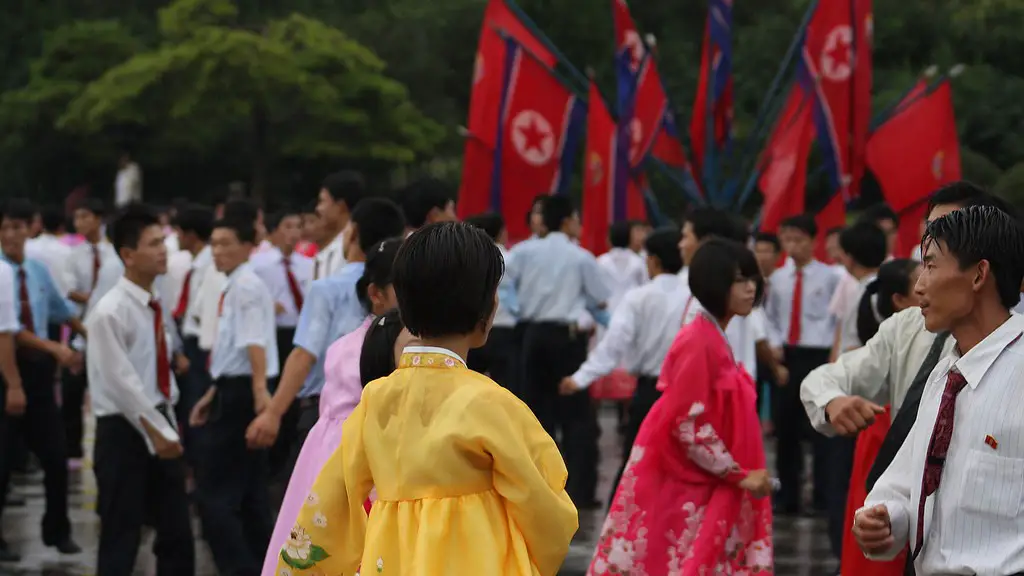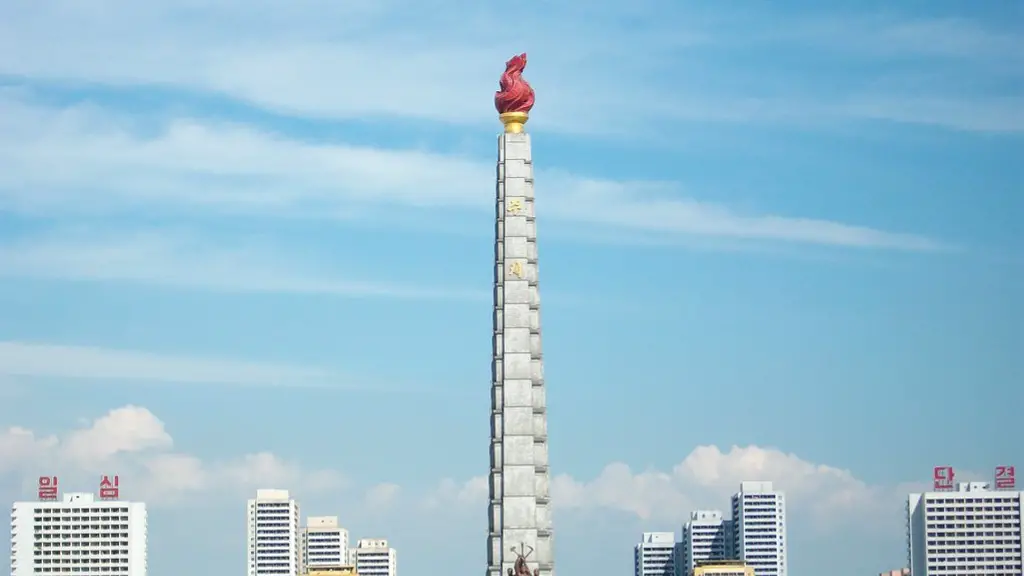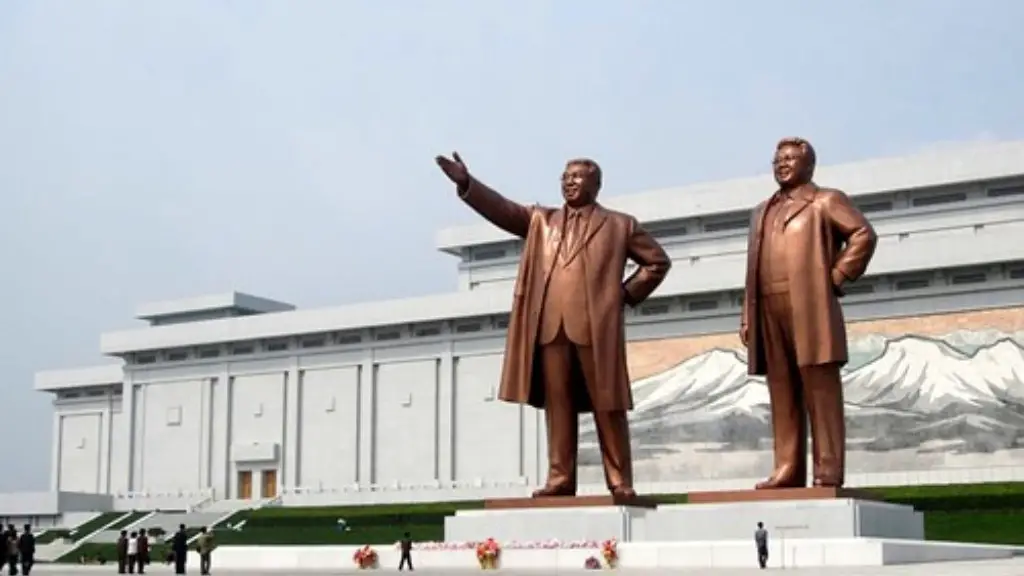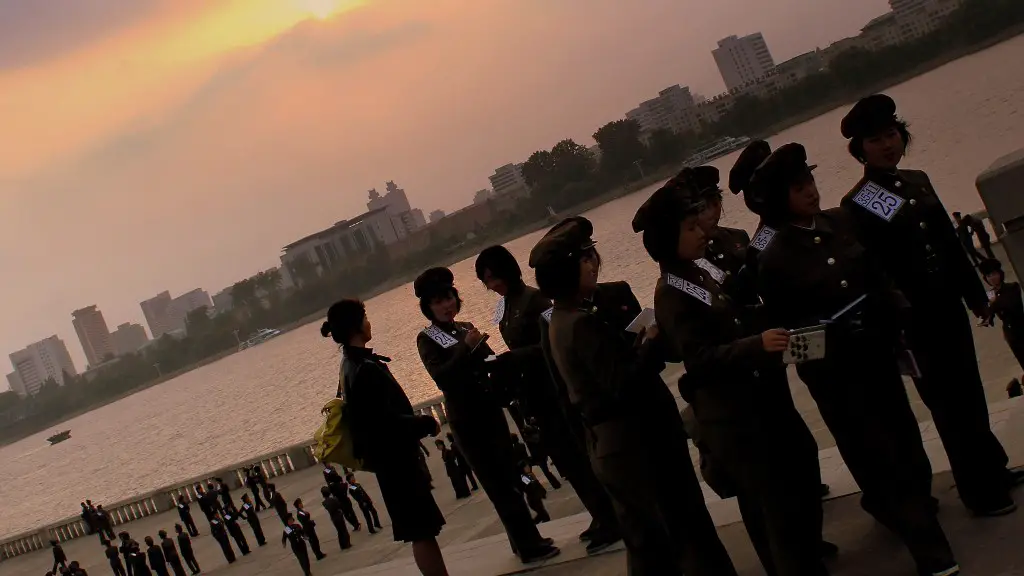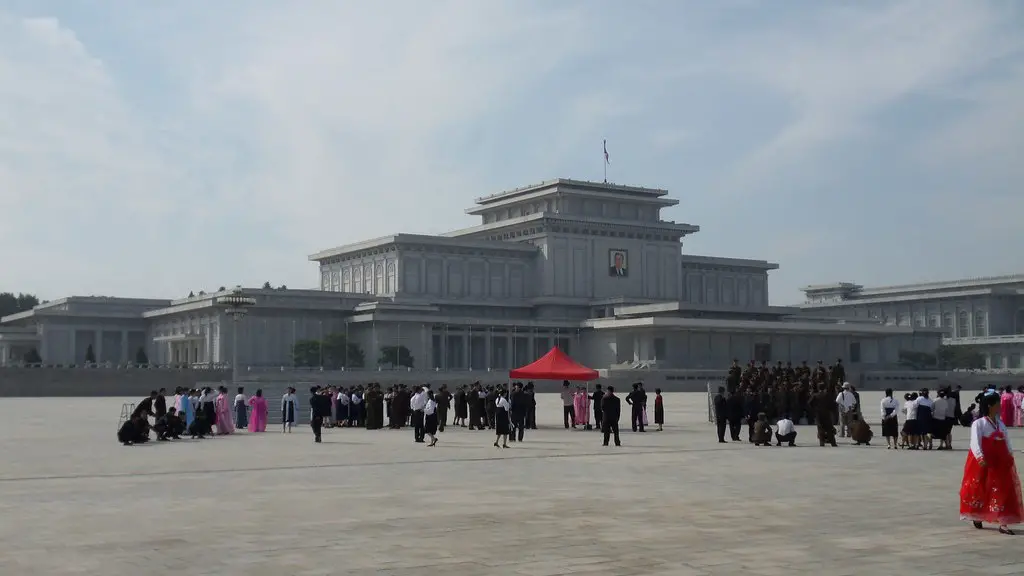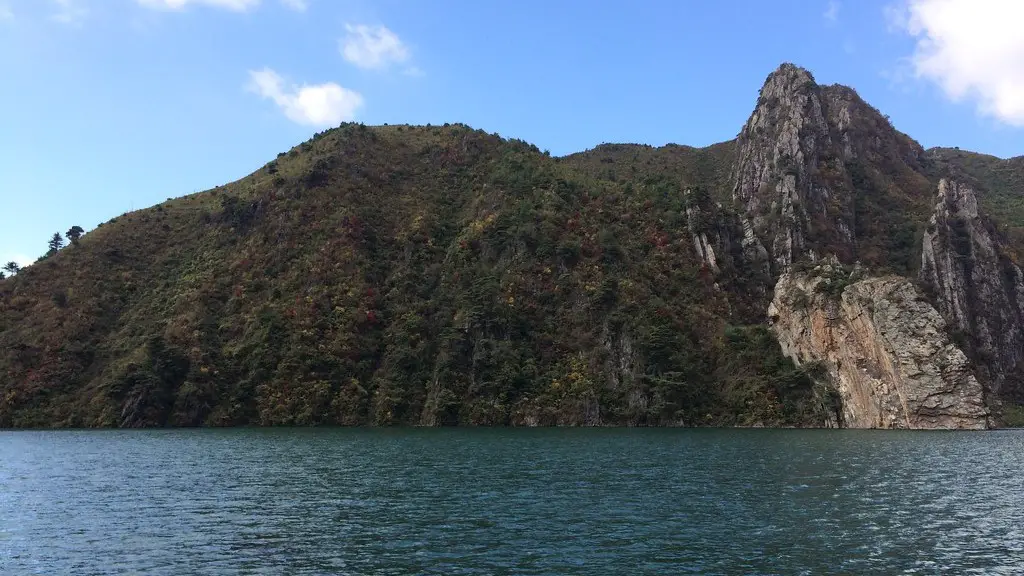As 2021 commences, many are looking to North Korea to see if the country will collapse. It’s been a nation in crisis for decades, and so far, the government has managed to remain largely uninterrupted. But it’s a common but false assumption that the country is simply stable, as life is far from stable for everyday North Korean citizens. Experts have long speculated that the country is in a dire state, with many internal and external threats posed to it. In this article, we’ll delve into the array of factors contributing to North Korea’s precarious situation, and see if a collapse is likely or not.
To get a better sense of what’s really going on inside the country, it’s important to understand its current geopolitical climate. It’s a country that has long been politically isolated from the rest of the world and has long been viewed as a volatile situation. The country is particularly dependent on trade with China, one of its few major allies, for resources and protection. In recent years, however, US President Donald Trump has taken a hard line stance against North Korea, introducing a series of economic sanctions that have put additional pressure on the country. In addition to economic strains, North Korea’s citizens have faced political oppression and the lack of freedom that has long been a hallmark of the country’s government. Political analysts worry that these factors make it inevitable that the country will eventually collapse.
Economically, the situation seems to be at a tipping point. A recent World Bank report estimated that the country’s GDP has declined by more than 25 percent between 1990 and 2020. Other reports have suggested that the economy is in a state of “stunted growth”, with investment and production stagnating, and an increasing reliance on the black market. In addition, the ruling Kim family’s inability to adopt economic reforms has only worsened the situation. Recent pressure from the US in the form of increased sanctions has only further exacerbated the state of North Korea’s economy and raised the possibility of a collapse.
Looking to 2021, it’s clear that North Korea is presented with a myriad of risks that threaten the country. From its volatile geopolitical situation, to its sinking fortunes economically, to its long-running political oppression, the country seems to be at the brink of a collapse. While the Kim regime has managed to remain in power so far, the current situation appears to be untenable, and it’s difficult to predict how much longer it can remain in power. In addition, many experts believe that a collapse of North Korea is inevitable given the country’s current situation.
Social Unrest
Social unrest is increasingly becoming more common within North Korea, and this is a major concern among experts. Citizens are becoming increasingly unhappy with the government, as they continue to be subject to oppression, censorship and a lack of basic rights. The conditions under which North Koreans are living in are dire, and it’s only likely to get worse in 2021. As the economy worsens, poverty and hunger become more common, and the people become increasingly desperate for change. This creates an ideal ground for civil unrest, and this could potentially be a catalyst for a collapse.
But social unrest only goes so far, and many experts believe that the military is the true force that will be the deciding factor in a collapse or not. North Korea has the fourth largest army in the world, and it is heavily committed to the regime. If that support wavers, it is likely to precipitate an end to the Kim regime. But while that scenario is a possibility, there is no indication that the military will turn on the regime, and instead, there have been reports of them becoming more committed to it.
The international community has also been pushing for reform in North Korea, and while it has had limited success so far, efforts are unlikely to cease in 2021. The current administration in the US is pushing for a diplomatic solution to the crisis, and other nations have also been calling for reforms. China has also signified their willingness to step in and help out. All this could potentially lead to reforms that could help to prop up the country and its regime.
Relations With South Korea
The relationship between North and South Korea has been a long-time source of tension, and it could be one of the deciding factors in a collapse. North Korea and South Korea remain technically at war, and tensions have been steadily escalating in recent years. North Korea has shown aggression towards its South Korean neighbor in the form of military drills and shows of force, which is an indicator that negotiations between the two countries won’t be occurring any time soon. Any sort of collapse of North Korea could lead to imminent conflict with South Korea, and if the two countries went to war, the consequences could be dire.
Things could still change though—recent history has shown that peaceful negotiations between the two are possible. Of course, this is a tricky situation, as globally, North Korea is seen as a rogue nation, and so far its protests to the international community have gone unheard. However, if the international community could finally pressure North Korea into negotiations and peace with its southern neighbor, it could potentially help to alleviate the escalating tensions.
At the same time, if successful negotiations don’t take place and South Korea feels as if it can no longer cope with the risk of war on its northern border, it may decide to take matters into its own hands. In 2021, South Korean President Moon Jae-in may consider a preemptive strike against North Korea as a last resort to ensure his people’s safety—it is a possibility that many analysts are already discussing. Such an action would only further destabilize the already precarious situation in North Korea.
Rising Sun
The rising sun in East Asia is another factor that could potentially signal an end to the North Korean regime. Japan, a longtime rival of North Korea, has recently taken steps to strengthen its military and become more assertive in international political matters. Japanese Prime Minister Shinzo Abe has notably taken a hard line against North Korea in the past, often refusing to engage in any form of dialogue. This could be a major obstacle for North Korea if it sees in 2021, as the Japan could attempt to push for regime change in the country.
Furthermore, many Japanese citizens have long called for the country to take a more active role in addressing the threat of North Korea. In addition, the rising power of China could potentially be a source of further problems for North Korea, as the two countries have been historic rivals. China has also been a key economic and political supporter of North Korea, and the weakening of that relationship could prove to be the final nail in the coffin for the Kim regime.
International Pressure
In 2021, the world will be watching North Korea more closely, in hopes of finding a path to peace. International communities and NGOs will be increasingly critical of the government’s actions, and pressure is likely to mount on the country as the year goes on. The US will also continue to put pressure on North Korea’s leadership by imposing economic sanctions, and this could very well be a decisive factor in deciding the regime’s future.
Furthermore, the UN, the EU and other major global powers have become increasingly involved in trying to bring about change in the country. Efforts have been made to document and expose human rights abuses, and to bring attention to the plight of the North Korean people. In addition, negotiations between North Korea and its neighbors could be instrumental in achieving a diplomatic solution to the crisis.
It is difficult to predict the future of North Korea in 2021. While the country is facing immense pressure and an uncertain future, it is still unclear if these forces will lead to a collapse or not. The current situation seems increasingly untenable, with both internal and external forces stoking instability. But regardless of whether or not a collapse occurs, it is important to remember the people of North Korea who are caught in the crossfire, and for the international community to remain committed to helping them.
Military Intervention
Military force seems ever-present in the North Korean equation. Though it remains unlikely that anyone but the country itself would be willing to risk foreign militaries on its soil, the presence of so many regional neighbors could be enough to bring some form of change. As the situation shifts and an economic collapse looks more and more certain, the possibility of military intervention remains a very real one. China, Japan, and South Korea could all be considered important allies in the current upheaval, and they could also send troops in as a last-ditch effort to ease the situation internally.
The US could also be a potential candidate for intervention, with their strong military power existing as a threat. President Donald Trump has previously hinted at taking action against North Korea and it is possible that US forces could be sent in for a variety of reasons. In particular, the US is heavily invested in the safety of South Korea and could choose to interfere if North Korea’s aggression gets too close for comfort.
Regardless, it still seems unlikely that any military force will be used as a means of intervention. Many countries would be unwilling to risk a direct confrontation with North Korea, due to the danger of a complete escalation of the situation. The only realistic option is then diplomatic action, hoping to bring a peaceful resolution to the situation by weakening the regime through sanctions and economic pressure.
Domestic Resentment
The Kim regime still maintains its iron grip on the country, but that grip is starting to slip. Internal opposition to the leadership is growing steadily and the people are growing more and more restless with the lack of liberties afforded to them. This domestic resistance could potentially lead to a collapse, should it reach a tipping point within the nation. Domestic resentment over matters such as human rights abuses and the government’s handling of the nuclear crisis could be the catalyst for change, but it still remains to be seen if this is truly the case.
Domestic pressure is also coming from within the ranks of the North Korean military. The military, composed mostly of Kim loyalists, has been increasingly vocal about the lack of economic progress within the country. With the increasing economic sanctions imposed by the US, the morale of the military has been lowered and the generals are beginning to worry about the direction of the country. It is possible that these open signs of dissent could be the beginning of the end for the Kim regime.
Overall, North Korea is a complex and unpredictable situation in 2021. The country is facing immense pressure from within and without, and only time will tell if it manages to withstand the forces or if a collapse is inevitable. The future of the Kim regime hangs in the balance and the country’s citizens remain desperate for change. Ultimately, it is up to the international community and the citizens of North Korea to prepare for whatever may come.
